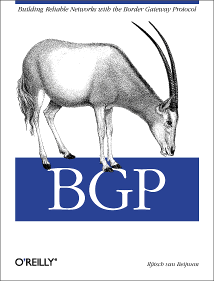
|

|

|
|
Home ·
BGP Expert Test ·
What is BGP? ·
BGP Vendors ·
Links ·
Archives ·
Books ·
My New BGP Book | ||
 (advertisement)
(advertisement)
| ||
|
no ip unreachables (posted 2003-12-30)
In an article earlier this year I talked about problems with path MTU discovery (PMTUD). (You may want to look at the links.) Quick recap:
One thing that many people may not realize is that the Cisco "no ip unreachables" directive turns off generation of ICMP "packet too big" or "fragmentation needed and DF bit set" messages for a router interface. ICMP messages have a type and a code. (IANA has the full list.) Type 3 covers different kinds of destination unreachable errors, including "packet too big" which is code 4 under type 3. Unfortunately, the Cisco documentation isn't particularly helpful. Under Configuring IP Services:
Enabling ICMP Protocol Unreachable Messages
If the Cisco IOS software receives a nonbroadcast packet destined for itself that uses an unknown protocol, it sends an ICMP protocol unreachable message back to the source. Similarly, if the software receives a packet that it is unable to deliver to the ultimate destination because it knows of no route to the destination address, it sends an ICMP host unreachable message to the source. This feature is enabled by default. The fact that the ip unreachables command also affects sending of packet too big messages isn't even hinted at... The same goes for the description of the command in the command reference section. Only an ICMP Services Example explains a little more:
Disabling the unreachables messages will have a secondary effect—it also will disable IP Path MTU Discovery, because path discovery works by having the Cisco IOS software send Unreachables messages. However, there still is no warning that disabling unreachables will make anything connected to links with reduced MTUs virtually unreachable, as nearly all hosts send all their packets with the DF bit set. And there are many people recommending "no ip unreachables": a Google search reveals this combination of words shows up, ironically, a little more than 1500 times. There is a good use for this command, however: when a range of addresses is routed to the null interface, and "no ip unreachables" in configured for the null interface, any packets to the destinations in question will be dropped at the CEF level. Note that "no ip unreachables has affect on packets routed to the null interface, which is different from the behavior on other interfaces, where the command determines whether unreachables are sent back in response to packets received on the interface. Most link types have a fairly fixed MTU (such as ethernet with its 1500 bytes) or support negotiation of the MTU (such as PPP). However, some link types make it very easy for both ends to set different MTUs. This regularly happens with Cisco's HDLC on serial links. In this case, the packets can't be received successfully at the end using the smaller MTU. Fortunately, debugging is easy: if the MTU is 1500, set it much higher, if it's larger than 1500, set it to 1500. In most cases this will clear up the problem. Or just switch to PPP... The same problem can happen on tunnels, but from what I've seen many systems just accept the too-large packets. This leads to strange path MTU discovery behavior as the link then has different MTUs in both directions, but this shouldn't be much of a problem. I think the moral of this story is that it's probably not worth the trouble to run path MTU discovery on systems that have a 1500 byte MTU. Since all systems behind links that don't support 1500 bytes need to implement ugly hacks such as clearing the DF bit or rewriting the TCP MSS option anyway, the resulting increase in fragmentation on the network will be negligible and it should save significantly on debugging. Can't get enough of fragments? Have a look at a CAIDA analysis.
|
